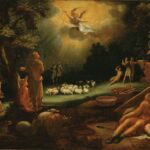Peace on earth is one of the great themes of Christmas. Everyone can picture Linus quoting from Luke 2 in the King James Version. “Glory to God in the highest, and on earth peace, good will toward men… That’s what Christmas is all about Charlie Brown.” And after all we’ve been through in the past few years, that sounds appealing!
But just what does peace on earth mean?
Peace on Earth to Those on Whom His Favour Rests
Well, first of all, we need to acknowledge that modern translations of the Bible differ slightly from the King James Version of Luke 2:14 by making it more specific. The NIV has “Glory to God in the highest heaven, and on earth peace to those on whom his favour rests.” The goodwill/favour of God describes the people who receive God’s peace.
Rather than God giving peace and goodwill to all people on earth, He gives peace to some people on earth, specifically those who have His favour.
If we’re tempted to think that we’re nitpicking and ruining the “meaning of Christmas”, look at what Jesus said in Luke 12:49-51, “I have come to bring fire on the earth, and how I wish it were already kindled! But I have a baptism to undergo, and what constraint I am under until it is completed! Do you think I came to bring peace on earth? No, I tell you, but division.”
Jesus didn’t come to make things easy. He didn’t come so everyone would get along. Peace on earth? At least in this context, the Bible says he came to bring division. This division is what the angels alluded to in Luke chapter 2.
Peace on Earth—and Division?
Peace on earth is only for those on whom God’s favour rests, and everyone else will receive the fire of judgment. Jesus goes on in Luke 12 to speak of how this division would even split families as some took one side and some the other. That doesn’t sound like peace on earth at all. At least not the kind we traditionally associate with Christmas. These words of Jesus may not sit well with us, but they are too important to ignore. There is a division in humanity that determines whether we receive peace or judgment, so we have to keep digging to find what causes that division.
We find the answer in Luke 19, the account of the Triumphal Entry of Jesus into Jerusalem on Palm Sunday. As Jesus rides into town on the colt, the people say, “Peace in heaven and glory in the highest!” (v 38). That should sound familiar because it’s almost exactly what the angels said at Jesus’ birth. Except now it’s about peace in heaven.
What is happening here?
Luke, carried along by the Holy Spirit (2 Peter 1:21) is skillfully telling the story of Jesus and weaving the themes together to point us to the truth of who He is and why He came. He’s showing us that peace on earth is tied to peace in heaven, and both are tied to Jesus.
As we read the rest of chapter 19, it becomes clear that despite the excited crowds, Jesus will be rejected by the people, and as a result, they will forfeit peace on earth (19:39-44). But even worse, in rejecting Jesus, they have rejected God Himself (verse 44) and rejected peace in heaven.
And so we see that Jesus is the dividing line in humanity between peace and judgment. To reject Him is to forfeit God’s favour. But the beautifully ironic message of the gospel is that the rejection of Jesus brought us peace in heaven. Jesus always knew why He was coming to Jerusalem.
His rejection and crucifixion were the plan all along (the baptism he spoke of in 12:50 as He was plunged into God’s wrath for sin). Jesus was rejected and crucified for our sins. He took the penalty so we could have peace with God.
For those who have peace in heaven, the favour of God, peace on earth is a guaranteed promise. But that promise hasn’t reached its fulfilment yet. Full, true peace on earth will only come when He returns in glorious victory. Then the promise of the angels in Luke 2 will finally be realized. We shouldn’t expect life on earth to be too comfortable or easy in the meantime.
Peacemaking
The division Jesus spoke of in Luke 12 will bring His disciples into His suffering. Just as Jesus was rejected by the world, so will His disciples be. But as we wait for the day of His return, we are called to be peacemakers in the world (Matthew 5:9). To live as Christ lived, loving others and sacrificing for them. Laying aside our pride and our rights to show mercy and forgiveness. The promise given to people who live like that is that they will be blessed and be called children of God.
The world will see a reflection of Jesus in us that brings just a little peace on earth and draws the people around us into a relationship with Jesus that will bring them peace in heaven.























